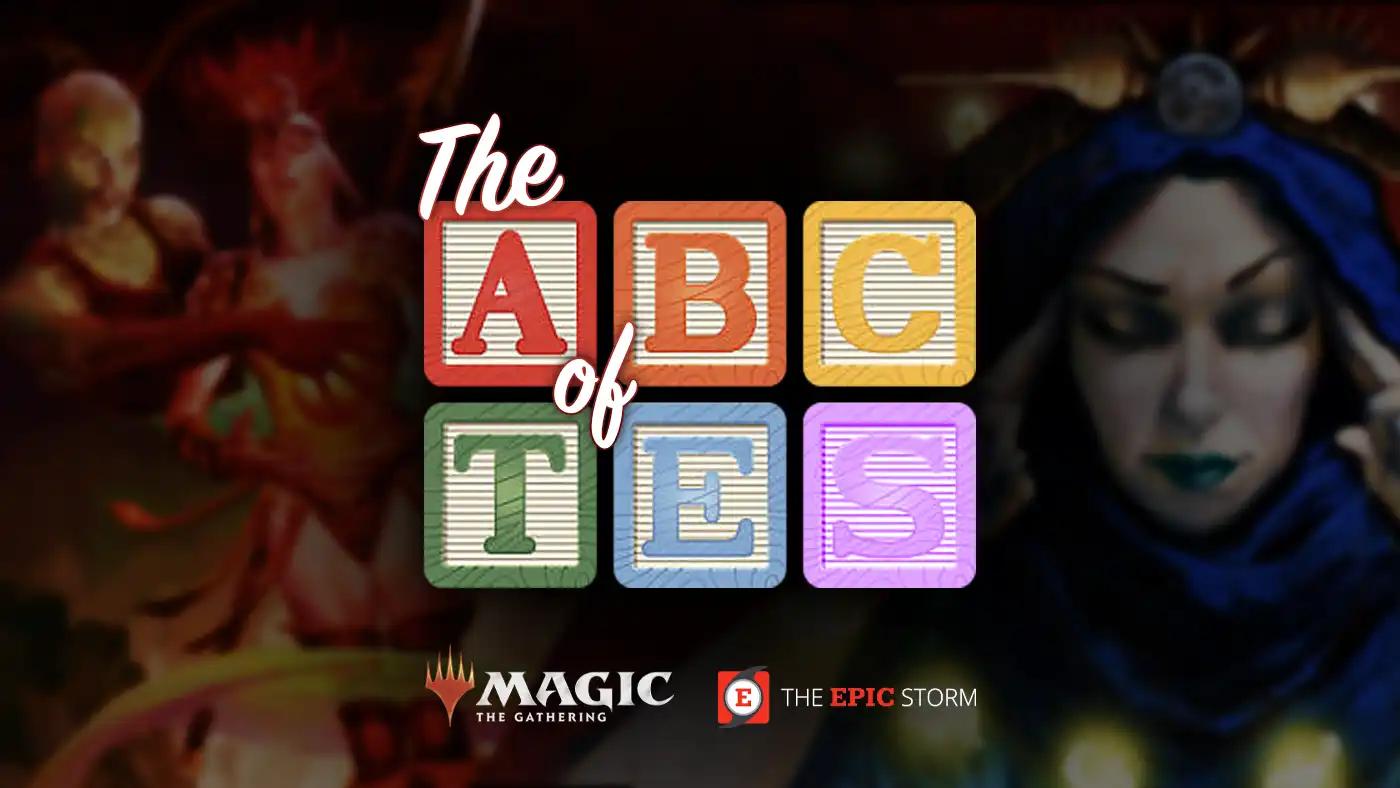Understanding the mechanics and basic decisions with The EPIC Storm is only the first step in achieving mastery. One of the strengths of the deck is it’s supreme flexibility and ability to play multiple different games, depending on what is needed in the moment. Understanding what the opposing deck is and what the plan for that matchup is are the keys to leveling up as a Storm player.
What is a matchup?
Every deck in Legacy has a different way they interact with The EPIC Storm. That interaction dictates the speed of the matchup. Against fair blue decks, for example, one can play much slower because they do not have fast ways to close the game and broadly only interact with counterspells. The speed of the matchup determines the value of each engine and card. Mulligans against different archetypes will look different! Bryant has a whole article series devoted to how to mulligan against specific decks.
Legacy broadly falls into four macro archetypes:
- Fair Blue: Delver/Control decks
- Chalice/Prison: Death & Taxes/Moon Stompy
- Non-blue: Elves/GW Depths
- Combo: Doomsday/Oops! All Spells
Fair Blue
The key to fair blue is patience. If the game goes on long enough, TES will out scale the blue player every time. TES out scales fair blue by simply presenting more two for ones than they can keep up with. Four copies of [[Veil of Summer]] trades with more [[Force of Will]] effects than they could possibly have in hand on any given turn. The onus is on the blue player to present something that wins the game to force the TES player to go off. Delver decks tend to do this better, given the amount of small threats they have, but in general against these decks, things get better and waiting pays off.
Cards to Beat
In game one, fair blue players normally only have counter magic to interact with whatever engine the TES player wants to put onto the stack. This means that [[Veil of Summer]] and [[Galvanic Relay]] are some of the premium cards in the matchup. It can even be safe to use [[Wishclaw Talisman]] to find a [[Galvanic Relay]] in game one, as the worst that can happen is another piece of counter magic or sometimes a [[Lightning Bolt]].
In game two, blue players may bring in some kind of hate permanent like [[Ethersworn Canonist]] or [[Counterbalance]]. This is why [[Abrupt Decay]] is part of the sideboard plan for every fair blue deck. Giving away a [[Wishclaw Talisman]] becomes less free, though it can still sometimes be the correct play!
The best way to beat the disruption that blue players have is [[Galvanic Relay]]. Resolving multiple [[Galvanic Relay]]s allows the TES player to overwhelm the blue player in card advantage.
Mulligan Decisions
Above all, keeping hands that play Magic is essential. As outlined above, taking the game longer is generally better. Ensuring that cards like [[Wasteland]] do not put a premature end to the game should be part of mulligan thoughts. Hands do not have to do something powerful fast. Developing into a strong protected turn three or four win is much better in the matchup.
Death & Taxes and Prison
Prison matchups are speed matchups. Both players are trying to establish something powerful quickly. The prison player wants to put something into play on turn one or two that stops the TES player from winning the game. Sometimes, it is possible to win through a [[Chalice of the Void]] on one or similar, but it is easier to win before too m
any lock pieces enter play. The more turns one gives a prison player, the more likely they are to find a lock piece.
Cards to Beat
[[Chalice of the Void]], [[Thalia, Guardian of Thraben]], [[Trinisphere]], and post board [[Leyline of the Void]] are the tools the prison players have to beat TES. Instead of having the normal suite of cards to beat counterspells, bringing in removal like [[Abrupt Decay]] and [[Chain of Vapor]] is the plan. Remember that [[Veil of Summer]] is not completely dead in these matchups however. If the opponent plays a [[Chalice of the Void]] on a number that is not one, the [[Veil of Summer]] can “remove” it.
Mulligans
Against prison decks, the cantrip heavy hands fall flat. They do not give the TES player time to develop. The goal should be to mulligan to something powerful on an early turn. [[Lion’s Eye Diamond]] tends to be one of the best cards in the matchup because it is the “fastest” piece of mana. It is also the fewest cards to do something powerful with [[Echo of Eons]]. Aggressively casting [[Echo of Eons]] has two purposes: first to attempt to win the game and second it potentially messes up the opponent’s hand to not have a turn one lock piece.
On the draw, keeping extra lands can be good to help play through [[Trinisphere]] or a similar effect. Being on the draw means that it is much harder to win before a lock piece comes down. Instead, one more often has to actually remove a prison piece. One of the best ways to remove all of the prison pieces is [[Burning Wish]] for [[Pulverize]]. Looking at [[Burning Wish]] as removal rather than action helps straighten out some hands.
Non-blue
These tend to be easiest matchups in the format. Sometimes one can win the game almost by accident before the non-blue player can do something meaningful. In general, these decks do not have ways to stop TES in game one, so keeping hands that win the game at a medium rate is fine!
Cards to Beat
In game one, the scariest card tends to be [[Collector Ouphe]]. These decks have effectively five copies of the card due to [[Green Sun’s Zenith]]. This is the speed constraint on the matchup. In game one, it is essential to win before the [[Collector Ouphe]] enters play.
Post board, it gets more complicated. Non-blue decks tend to bring in [[Force of Vigor]] and [[Mindbreak Trap]] to combat TES. This breaks into an awkward squeeze. The best way to beat [[Mindbreak Trap]] is to play out a lot of artifacts and then cast an engine at storm one or two. [[Force of Vigor]] does punish this exact play style. The other problem is that it is difficult to tell which card the opponent has. Both are silent in the fact that opponents will not be signaling these cards with their mana, but just with their cards in hand. The [[Collector Ouphe]] clock is the final nail in the coffin as it provides a timeline for them to win the game. The good part is that any given opponent is unlikely to have all of these cards. Trying to beat everything is a good way to lose the game quickly. Choosing what one is willing to lose to with the cards one has is much better. Playing out a few artifacts to try to bait a [[Force of Vigor]] or to see if the opponent will think about casting it is my preferred way of escaping the squeeze.
Combo
This is the most diverse set of decks on a macro archetype level. It can be broken down into three sub categories:
- Turn 1 combo decks: Oops! All Spells / Reanimator
- [[Force of Will]] combo decks: [[Doomsday]] / Sneak & Show
- Storm Mirrors: The EPIC Storm / Ad Nauseam Tendrils
Against Turn one combo decks, racing is the only thing that matters. Mulliganing down to five or four is fine in an attempt to produce an early win. Often one does not get a turn two against these decks because they are so fast. Against Reanimator specifically, [[Veil of Summer]] is an all star as it blanks their discard spells, counters [[Archon of Cruelty]] triggers and answers a [[Chancellor of the Annex]]. Of these very fast decks, it tends to be the slowest, so one can keep slower hands with a [[Veil of Summer]].
The [[Force of Will]] combo decks are some of the worst matchups in the metagame. They tend to win the game on a similar turn as TES and have [[Force of Will]] and other counter spells to interact with TES. Unlike playing against fair blue, they will just win the game if the TES player does not try to win before them. In these matchups, protected turn twos tend to be the best way to win games. These hands tend to be rare, so comboing on turn two even unprotected is fine if one believes that the opponent is going to untap and win the game.
In the storm mirror, everything revolves around [[Veil of Summer]]. This card is effectively [[Time Walk]] against ANT and still effective against TES. Speed does tend to matter in these matchups as neither player is great at stopping the other.
More Resources
If you want to learn more about matchups, every month theepicstorm.com chooses a deck and does a matchup profile on it. This means that there is an interview on Through the Looking Glass with an expert on another archetype, a Matchup Mulligan detailing the ins and outs of several hands and how they function in the matchup, and TES Matchup Battles which runs through a couple of game situations and talks about the important things in each matchup. All of those resources are available for free every month, but a week early on Patreon. The exact sideboard map with all of the ins and outs is also available on the Patreon and is updated with each version of The EPIC Storm. I am active in the Storm Discord and on Twitter to answer all of your Storm questions!










